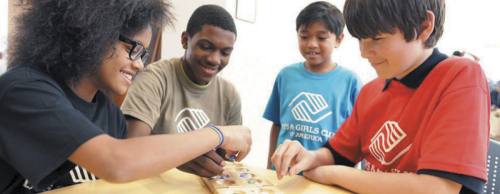Boys & Girls Club of Collin County serves 7,000 children every year through after-school, summer and outreach programs. CEO Michael Simpson—and former Frisco mayor—said he sometimes finds it funny when people think of the club as just an after-school program.
“We’re so much more than that,” he said. “We have three main focus areas: academic achievement, building character and leadership skills, health and life skills.”
Through a series of programs children receive help with homework, exercise and health.
“We’re really the premier after school program for children,” said Zane King, BGCCC vice president of resource development.
Other programs at BGCCC include drama education, teaching children how to be safe online and youth sports.
In 2014, 60 percent of children served by the BGCCC lived with a single parent and more than 50 percent lived in households that made less than $33,250. The median household income in Frisco is $115,603.
As the county continues to grow those numbers will continue to grow, King and Simpson said.
Simpson said with all the big companies moving to Collin County what follows are more service jobs.
“All those people working those service jobs are in households where mom and dad have to make a living,” he said. “So with both parents working, where do the kids go,” Simpson said.
That is where BGCCC comes in.
BGCCC was founded in 1969 as a way to help children find a safe place where they could grow and learn.
The club has four locations in Frisco, McKinney and Plano that serve all of Collin County and a few cities outside of the county.
 There are more than 3,000 volunteers serving the Boys & Girls Club of Collin County.[/caption]
There are more than 3,000 volunteers serving the Boys & Girls Club of Collin County.[/caption]
Given how many children BGCCC services, it needs at least nine or 10 locations, King said.
Simpson said the Frisco location is their fastest growing location and they are looking to expand and build a gym, which will require a fundraising campaign.
BGCCC is different from other clubs in that the communities they serve in Collin County are so spread out they have to provide transportation for most of the children in the organization. The club has 21 buses that take children from their schools to the club after school.
King said the club is crucial for the majority of the children they serve because the reality for these children could be different if the club did not exist.
“We’re not a nice thing to have, we’re not a good thing to have, we are a necessity,” King said. “Because the reality is if we weren’t open there is no place for these kids to go. This is a true safety net, it is a true necessity for these kids.”




